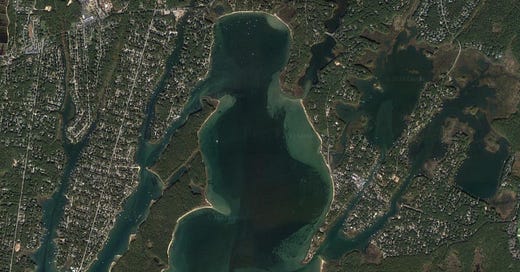Runoff and Warming Threaten Estuaries; Holtec Workers Exposed in 2020; Bill Advances in RI Senate to Reclaim Beach Access
Three Stories from Across the Region (with a tip of the hat to WHOI & the APCC, The Exchange Monitor, and The Boston Globe for their work on these stories).
New Paper Demonstrates Dangers of Eutrophication in Coastal Estuaries
(FALMOUTH) – A recent paper by Dr. Matthew H. Long, a coastal geochemist at the Woods Hole Oceanographic Institution (WHOI), and Jordan W. Mora, a restoration ecologist at the Association to Preserve Cape Cod (APCC), demonstrates that human-associated activities, particularly eutrophication, or nutrient-loading, primarily from runoff, and climate change, have played a significant role in fundamentally changing the ecology of Waquoit Bay, on the southern shore of Cape Cod and forming part of the boundary between the Towns of Falmouth and Mashpee.
( Waquoit Bay; photo credit — Google Earth.)
Waquoit Bay, the paper shows, shifted under human pressures over the last two decades from a benthic to a pelagic-dominated ecosystem, meaning that the bay has shifted from an ecosystem dominated by seagrasses, such as eel grass (Zostera marina) and macroalgae, dwelling on the bottom of the bay (“benthos” is ancient Greek for “depths”), to one dominated by phytoplankton dwelling in the upper (pelagic) parts of the water column.1




